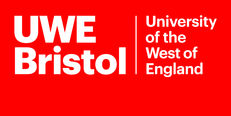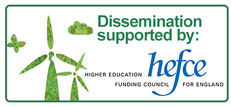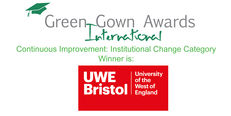International Green Gown Award Winner
Positive Footprint: Phase 2
Positive Footprints presents the University’s sustainability aims for the period 2013 – 2020. It defines the mechanisms by which sustainability is embedded within day to day operations and effective decision making; contributes to UWE Strategy 2020 ambition by advancing the health and sustainability of the city- region; supports the Strategy 2020 priorities of ready and able sustainability literate graduates and guides the development of sustainable estate infrastructure.
The 11 thematic areas in Positive Footprints each have an implementation plan detailing the actions that will be delivered and mechanisms to be followed to meet the aims of the plan. Each thematic area has a project group and these groups report on a quarterly basis to the Sustainability Board.
The whole University is accredited to the ISO14001 Environmental Management System and the NUS Responsible Futures mark and these are used to ensure management systems are in place to deliver high quality environmental outcomes.
Top 3 learnings
1 Recognise and embrace the leaders of change at all levels in the university who will support the cultural change required to embed sustainability within a university
2 Acknowledge that there are different rates of change in different parts of the university. Thus the approaches taken need to allow for different starting points, rates of change and destinations.
3 Recognise that all academic disciplines and professionals services are engaging, and can engage further, with the sustainability journey. The points of engagement may sometimes be difficult to see at first but they are there and they provide the way in to further exploration and engagement leading to capacity and capability development.
CO2t Savings: 20% CO2
Actual/Estimated: Target
No. of yrs: by 2020
Videos










 Except where otherwise stated, content on this site is
licensed under a Creative Commons Attribution 3.0 License.
Except where otherwise stated, content on this site is
licensed under a Creative Commons Attribution 3.0 License.
